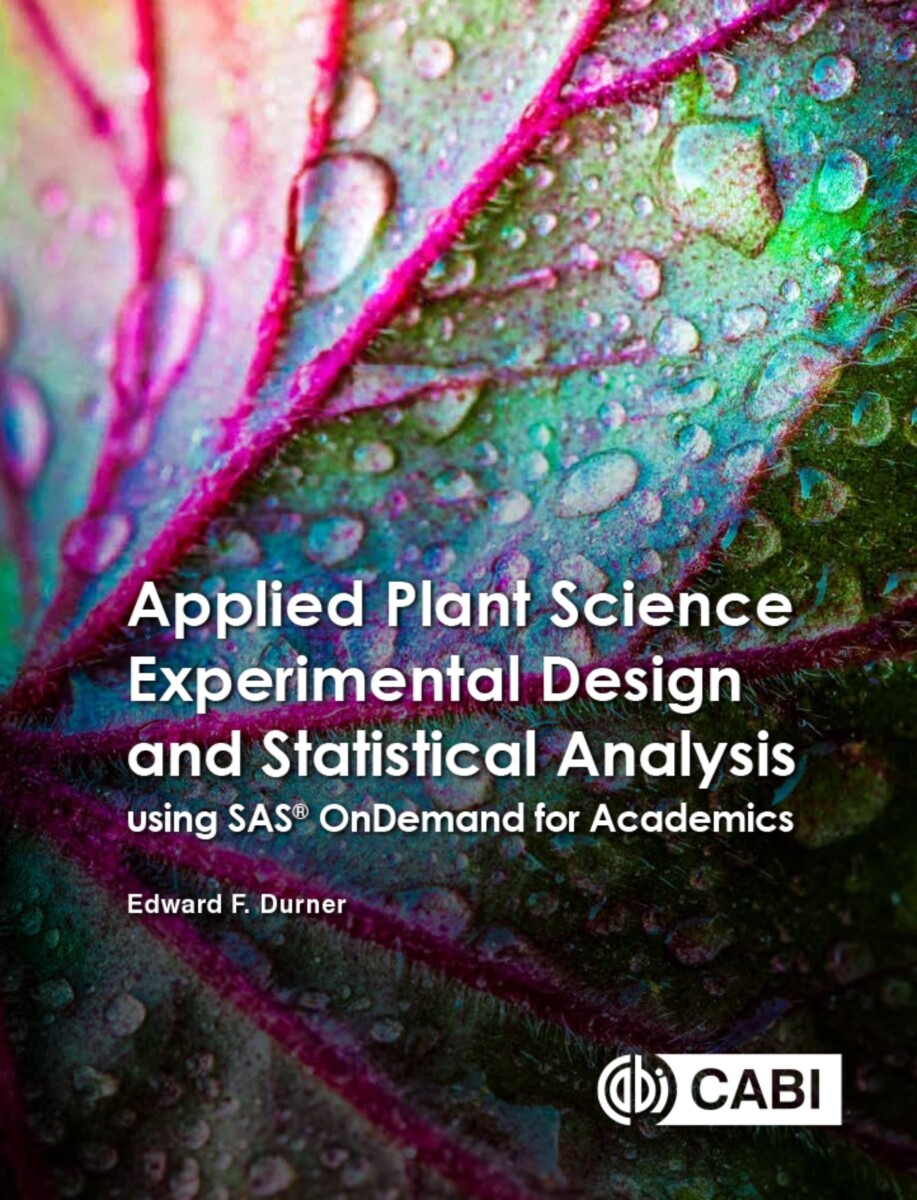Applied Plant Science Experimental Design and Statistical Analysis Using SAS® OnDemand for Academics
- Publisher
CABI - Published
30th June 2021 - ISBN 9781789245981
- Language English
- Pages 392 pp.
- Size 7" x 9"
- Request Exam Copy
- Publisher
CABI - Published
14th July 2021 - ISBN 9781789249927
- Language English
- Pages 392 pp.
- Size 7" x 9"
- Request Exam Copy
The correct design, analysis and interpretation of plant science experiments is imperative for continued improvements in agricultural production worldwide. The enormous number of design and analysis options available for correctly implementing, analyzing and interpreting research can be overwhelming. SAS® is the most widely used statistical software in the world and SAS® OnDemand for Academics is now freely available for academic institutions.
This user-friendly guide to statistics using SAS® OnDemand for Academics is ideal for facilitating the design and analysis of plant science experiments. It presents the most frequently used statistical methods in an easy-to-follow and non-intimidating fashion, and teaches the appropriate use of SAS® within the context of plant science research. This book:
- Covers experimental designs and data analysis protocols
- Is presented as a how-to guide with many examples
- Includes freely downloadable data sets
- Examines key topics such as merging data frames, multivariate analysis and linear regression
1: Introduction to Plant Science Research and Experimentation
2: An Introduction to SAS® OnDemand for Academics
3: A Review of Basic Statistics and Terms
4: Plant Science Research and Some Basic Experimental Design Principles
5: Variation and the Analysis of Variance (ANOVA)
6: The Completely Random Design
7: Factorials
8: Contrasts
9: Linear Regression
10: Regression Diagnostics
11: Mean Separation Techniques
12: The Randomized Complete Block Design
13: The Latin Square Design
14: The Split-plot Design and variations (split-split, split-block, strip-plot)
15: Experiments in a Series
16: Expected Mean Squares
17: Analysis of Covariance
18: Non-Parametric Procedures
19: Sampling
20: When Data Doesn’t Behave – Problem Data
21: Presentation of Research Results
Edward F. Durner, PhD
Edward F. Durner received his BS in Horticulture from the University of Maryland, his MS in Horticulture from Virginia Tech, and his Ph.D. in Horticultural Science from North Carolina State University. He joined the Horticulture Department at Rutgers in 1986 and conducted tree fruit physiology research, including peach flower bud cold hardiness, rootstock – scion interactions in peach and apple, and consumer acceptance of disease resistant apple cultivars. From the late 1990’s through 2005 his research focused on photoperiod and temperature conditioning of strawberry plug plants for off-season production. From 2006 – 2016 my research program was placed on hiatus to serve as Director of the Student Sustainable Farm at Rutgers, a student-run 5-acre CSA (Community Supported Agriculture) farm with 50 to 175 shareholders that provided experiential learning of organic vegetable, herb and flower production for students at Rutgers – The State University of New Jersey. In 2016 he returned to his roles in teaching and research, investigating alternative strawberry production systems and plant conditioning and goldenberry (Physalis peruviana) as a new fruit crop for North America. He teaches or has taught Applied Plant Science Statistics, Applied Physiology of Hort Crops, Agroecology Practicum, Fruit Production, Seminars in Horticulture, and Perspectives on Agriculture and the Environment.


